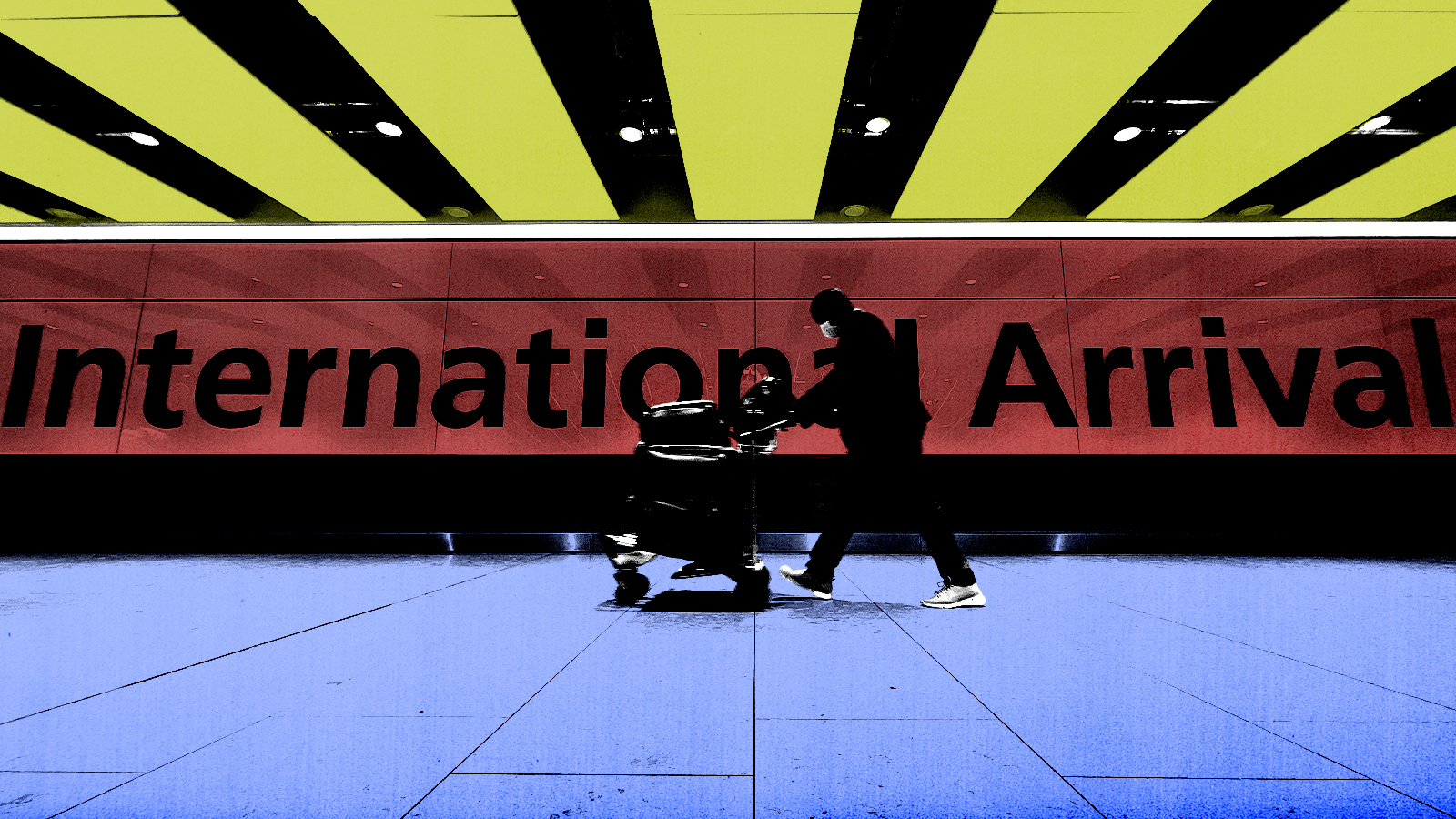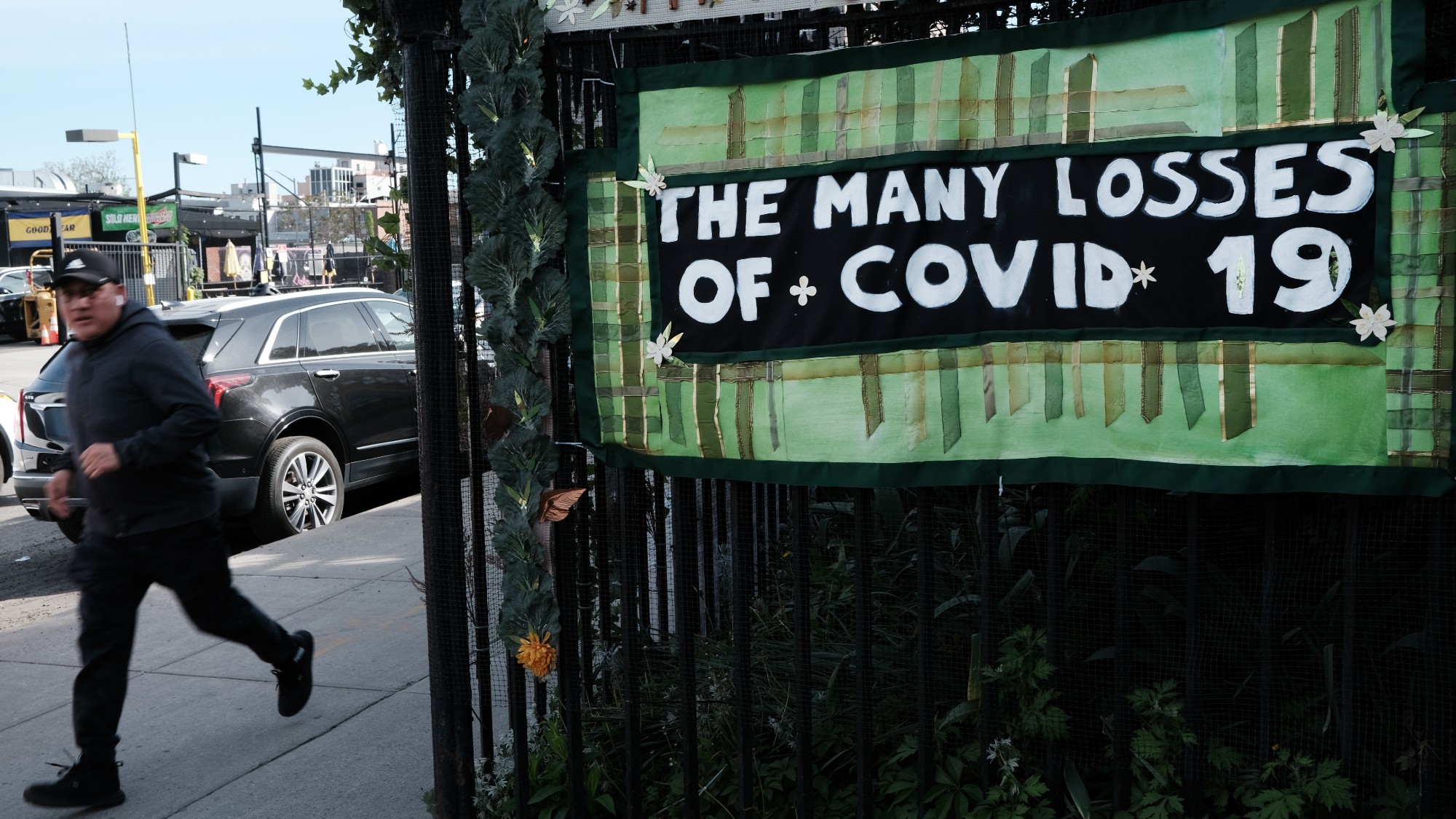Is the Omicron panic just the beginning of the way we live now?
A new variant emerges. Can the U.S. handle it?


A free daily email with the biggest news stories of the day – and the best features from TheWeek.com
You are now subscribed
Your newsletter sign-up was successful
Perhaps this is what endemic COVID looks like: Occasional weeks or months of relative normalcy punctuated by sudden bursts of fear and panic, continuing on and on into the foreseeable future.
Sounds exhausting, doesn't it?
I don't want to be a doomsayer, but a little bit of pessimism feels warranted after the emergence of Omicron as a COVID "variant of concern" over the weekend. The development shut down a chunk of international travel, sent markets tumbling, and generally threatened a widespread-but-fragile sense that maybe this time the worst of the pandemic was over, or almost so, for many of us. It was difficult to know whether to be terrified because of Omicron's many mutations that could render the virus impervious to our defenses, or hopeful that existing vaccines might prove effective against the new threat. As always, separating good information from the bad proved to be a Herculean task — the flurry of online speculation quickly outraced the few facts we do have. There's so much that isn't known yet.
The Week
Escape your echo chamber. Get the facts behind the news, plus analysis from multiple perspectives.

Sign up for The Week's Free Newsletters
From our morning news briefing to a weekly Good News Newsletter, get the best of The Week delivered directly to your inbox.
From our morning news briefing to a weekly Good News Newsletter, get the best of The Week delivered directly to your inbox.
The thing we do know? Omicron is coming to the United States, if it hasn't already arrived.
"Inevitably, it will be here," infectious diseases expert Dr. Anthony Fauci said Sunday morning on ABC's This Week. "The question is will we be prepared for it? If and when — and it's going to be when — it comes here, hopefully we will be ready for it."
Hopefully that's true, and Omicron won't turn out to be a Delta-style disaster. But even if the United States and the world somehow duck this particular bullet, the new variant makes a few things clear:
The federal government must, must, must become more nimble. The announcement of Omicron's arrival came just a week after the Centers for Disease Control finally approved vaccine booster shots for all adults. Plenty of observers believe it should have happened sooner. "I think the confusing message around the boosters may end up being one of the biggest missed opportunities in this pandemic," Dr. Scott Gottlieb, a former FDA commissioner, said earlier this month. Indeed, Democratic governors like Jared Polis in Colorado and Laura Kelly in Kansas stopped waiting and approved boosters in their states even before the CDC action.
A free daily email with the biggest news stories of the day – and the best features from TheWeek.com
Vaccine makers Pfizer and BioNTech now say they could ship variant-specific vaccines within 100 days, if necessary. It might be necessary — but it's difficult to have faith that the CDC and FDA will move with all due speed. The pandemic is nearly two years old, but Americans still don't have access to the kind of quick-and-easy COVID tests available to Europeans, largely because of U.S. agencies' laborious approval process. That obviously needs to change.
Anti-vax Republicans should shut up and get out of the way. Theoretically, lean-government conservatives ought to be great at streamlining cumbersome and outdated bureaucracies in order to keep Americans safe. That's not happening. Instead, Republican governors like Ron DeSantis in Florida and Greg Abbott in Texas have tried to block vaccine and mask mandates, while Fox News stars (and some Trumpist members of Congress) have spread conspiracy theories. That's why it was particularly galling last week when The Wall Street Journal — owned by Rupert Murdoch, who also owns Fox News — blamed President Biden for the rising COVID death toll.
It has always been the case that unvaccinated people risk not only their own health but also the well-being of their neighbors — in part because they serve as potential breeding grounds for COVID variants. It's probably not a coincidence that Omicron was first detected in South Africa, where barely more than a third of the population has received the jab. Every Tucker Carlson rant that encourages vaccine hesitancy makes the next deadly variant a bit more likely.
Worldwide vaccination efforts must be redoubled. My colleague Ryan Cooper has been an insistent voice urging rich nations like the U.S. to ensure COVID vaccines reach poorer nations. "Obviously it's immoral to let people die by the millions because they live in places too impoverished or dysfunctional to obtain or distribute vaccines," he wrote in September. "But it's also bad for everyone because allowing the virus to circulate in the Global South risks new variants cropping up that could get around the vaccines and harm rich countries." It should now be clear that he is right.
President Biden on Friday said "the United States has already donated more vaccines to other countries than every other country combined." Clearly, that's not enough. Biden has also called on the World Trade Organization to waive intellectual property rights on vaccines and other supplies so that poorer nations can scale up their efforts, but wealthy countries like the United Kingdom and European Union nations are opposed. Omicron should force a rethinking of those priorities.
Even if all those things happen, though, Omicron is yet another reminder that the new normal might not look like the old one. We're all eager to move on. "When can the COVID masks finally come off?" the New York Times asked earlier this month. Right now — and perhaps for a very long time to come — the answer is: "Not quite yet."
Joel Mathis is a writer with 30 years of newspaper and online journalism experience. His work also regularly appears in National Geographic and The Kansas City Star. His awards include best online commentary at the Online News Association and (twice) at the City and Regional Magazine Association.
-
 Political cartoons for February 16
Political cartoons for February 16Cartoons Monday’s political cartoons include President's Day, a valentine from the Epstein files, and more
-
 Regent Hong Kong: a tranquil haven with a prime waterfront spot
Regent Hong Kong: a tranquil haven with a prime waterfront spotThe Week Recommends The trendy hotel recently underwent an extensive two-year revamp
-
 The problem with diagnosing profound autism
The problem with diagnosing profound autismThe Explainer Experts are reconsidering the idea of autism as a spectrum, which could impact diagnoses and policy making for the condition
-
 The billionaires’ wealth tax: a catastrophe for California?
The billionaires’ wealth tax: a catastrophe for California?Talking Point Peter Thiel and Larry Page preparing to change state residency
-
 Bari Weiss’ ‘60 Minutes’ scandal is about more than one report
Bari Weiss’ ‘60 Minutes’ scandal is about more than one reportIN THE SPOTLIGHT By blocking an approved segment on a controversial prison holding US deportees in El Salvador, the editor-in-chief of CBS News has become the main story
-
 Has Zohran Mamdani shown the Democrats how to win again?
Has Zohran Mamdani shown the Democrats how to win again?Today’s Big Question New York City mayoral election touted as victory for left-wing populists but moderate centrist wins elsewhere present more complex path for Democratic Party
-
 Millions turn out for anti-Trump ‘No Kings’ rallies
Millions turn out for anti-Trump ‘No Kings’ ralliesSpeed Read An estimated 7 million people participated, 2 million more than at the first ‘No Kings’ protest in June
-
 Ghislaine Maxwell: angling for a Trump pardon
Ghislaine Maxwell: angling for a Trump pardonTalking Point Convicted sex trafficker's testimony could shed new light on president's links to Jeffrey Epstein
-
 The last words and final moments of 40 presidents
The last words and final moments of 40 presidentsThe Explainer Some are eloquent quotes worthy of the holders of the highest office in the nation, and others... aren't
-
 The JFK files: the truth at last?
The JFK files: the truth at last?In The Spotlight More than 64,000 previously classified documents relating the 1963 assassination of John F. Kennedy have been released by the Trump administration
-
 'There is a certain kind of strength in refusing to concede error'
'There is a certain kind of strength in refusing to concede error'instant opinion 'Opinion, comment and editorials of the day'
